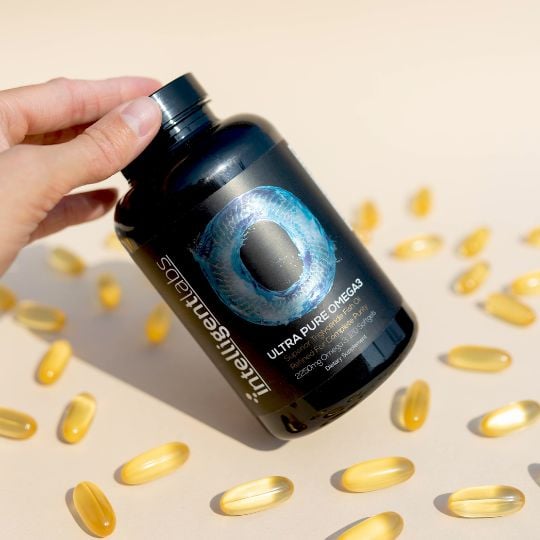Every heartbeat is a precious moment, a gentle reminder to cherish life and make heart-friendly choices, including choosing the right supplements that can help keep your heart healthy. In this blog post, we’ll compare CoQ10 and fish oil, two supplements known for their heart benefits, and see which is right for your needs.
Table of Contents
Why is it so important to take care of your heart?
Your heart does more than just beat; it’s the engine pumping life through your body, delivering nutrients to tissue and clearing away waste. Given its vital role, any issue can ripple out, affecting your overall health.
It’s no wonder, therefore, that heart disease is the leading killer worldwide, with an estimated 17.9 million people dying each year from cardiovascular diseases. Many of these are premature deaths, occurring in people under 70.1
The good news is that simple lifestyle tweaks – eating anti-inflammatory foods, exercising, quitting smoking, and choosing the right supplements like CoQ10 and fish oil – can make a big difference. 2
What’s the difference between CoQ10 and fish oil?
CoQ10 is an antioxidant your body makes naturally. It powers up the mitochondria, the energy centers of your cells. It’s particularly crucial for high-energy organs, like the heart, kidneys, liver, muscles, and brain. 3
However, our bodies produce less CoQ10 as we age, making CoQ10 supplementation potentially beneficial, especially for heart health.
On the other hand, fish oil is derived from sardines, anchovies, salmon, herring, mackerel, tuna, and other oily fish. Fish oil is packed with omega-3 fatty acids, which are essential fats that our bodies can’t make.
DHA (docosahexaenoic acid) and EPA (eicosapentaenoic acid) are the main types of omega-3 fatty acids found in fish oil. Both DHA and EPA help maintain healthy cell membranes and have anti-inflammatory properties, among many other fish oil health benefits.
CoQ10 vs Fish Oil: How do they help with heart health?
Both CoQ10 and Omega-3 fish oil support heart health, but they do so in different ways:
Here’s how CoQ10 supports your heart
CoQ10 is found in the highest concentration in the heart, more so than in any other organ.4 This is significant because CoQ10 plays a critical role in helping heart cells produce energy and protecting them against oxidative damage.5

Studies suggest that as many as 75% of patients with heart disease have low levels of CoQ10.6
Supplementing with CoQ10 has been shown to not only improve overall cardiovascular health, but also to reduce the risk of severe cardiac events, such as heart attacks and strokes. 7
Moreover, CoQ10’s benefits go beyond heart cell health. It may also help lower the risk of developing hypertension, a major risk factor for heart disease. Additionally, it may also improve blood circulation within the cells that line the arteries, veins, and capillaries. 8
In terms of cholesterol management, CoQ10 may optimize lipid profiles by increasing good (HDL) cholesterol and decreasing bad (LDL) cholesterol and triglycerides. Thus, CoQ10 may help lower the overall risk of heart disease. 9
Here’s how Omega-3 fish oil supports your heart
The Omega-3 fatty acids found in fish oil, specifically EPA and DHA, are the duo responsible for fish oil’s heart benefits. These fatty acids are known to lower the risk of coronary heart disease and heart attacks by managing several key risk factors.
According to Ines and Calder, the cardioprotective effects of EPA and DHA stem from their ability to manage cholesterol and lipid levels, maintain normal blood pressure, reduce the risk of arrythmias, promote arterial health, and fight inflammation. 10

However, studies that specifically compared DHA and EPA suggest that these two fatty acids have different effects on heart health. Here are a few examples:
- While both EPA and DHA reduce blood triglycerides, DHA has a slightly stronger effect. 11
- DHA seems to be more effective than EPA in lowering blood pressure and heart rate. 12
- DHA enhances vasodilation (widening of blood vessels) and reduces vasoconstriction (narrowing of blood vessels) 13
- Both EPA and DHA have similar effects on reducing inflammation in the body. 14
That said, these studies are just the tip of the iceberg. More research is needed to fully understand both the distinct and combined impacts of DHA and EPA on heart health.
What’s the recommended CoQ10 and fish oil dosage for heart health?
There’s no one-size-fits-all dosage for heart health, but general guidelines suggest:
- Suggested CoQ10 dosage: 50-200mg per day for heart support,15 with some studies recommending up to 400-500mg for cholesterol management.16
- Suggested fish oil dosage: 250-500mg of combined EPA and DHA per day, with up to 5g considered safe for daily intake. However, larger doses should be done under medical supervision since 2-6 grams per day may slightly raise LDL (bad) cholesterol levels.17
Can I take fish oil with CoQ10?
Yes, taking CoQ10 and fish oil together is generally safe, but it’s best to consult with your doctor, especially if you’re on other medications.
Which is better absorbed by the body – CoQ10 or fish oil?
Both supplements are well-absorbed when taken with meals that contain fats, as they are both fat-soluble nutrients.
So, which is better for your heart? CoQ10 or Fish Oil?
The choice between CoQ10 and fish oil largely depends on your specific health needs. CoQ10 is excellent for energy production and antioxidant protection, particularly in the heart. On the other hand, fish oil offers broad cardiovascular support, helping manage risk factors like blood pressure and cholesterol.
For comprehensive benefits, combining both CoQ10 and fish oil might be your best bet (but please remember to consult your doctor before doing so)!
💬 Something on your mind? Share your thoughts in the comments. We love hearing from curious minds.
📩 And while you’re here, join our newsletter for more smart stuff (and secret perks)!
References:
- World Health Organization. “Cardiovascular Diseases.” World Health Organization, 2023, www.who.int/health-topics/cardiovascular-diseases#tab=tab_1. ↩︎
- Casas, Rosa, et al. “Nutrition and Cardiovascular Health.” International Journal of Molecular Sciences, vol. 19, no. 12, 11 Dec. 2018, p. 3988, https://doi.org/10.3390/ijms19123988. ↩︎
- Saini, Rajiv. “Coenzyme Q10: The Essential Nutrient.” Journal of Pharmacy and Bioallied Sciences, vol. 3, no. 3, 2011, p. 466, https://doi.org/10.4103/0975-7406.84471. ↩︎
- Aberg, F., et al. “Distribution and Redox State of Ubiquinones in Rat and Human Tissues.” Archives of Biochemistry and Biophysics, vol. 295, no. 2, 1 June 1992, pp. 230–234, https://doi.org/10.1016/0003-9861(92)90511-t. ↩︎
- Zozina, Vladlena I., et al. “Coenzyme Q10 in Cardiovascular and Metabolic Diseases: Current State of the Problem.” Current Cardiology Reviews, vol. 14, no. 3, 1 Aug. 2018, pp. 164–174, https://doi.org/10.2174/1573403X14666180416115428. ↩︎
- Kumar, Adarsh, et al. “Role of Coenzyme Q10 (CoQ10) in Cardiac Disease, Hypertension and Meniere-like Syndrome.” Pharmacology & Therapeutics, vol. 124, no. 3, Dec. 2009, pp. 259–268, https://doi.org/10.1016/j.pharmthera.2009.07.003. ↩︎
- Rabanal-Ruiz, Yoana, et al. “The Use of Coenzyme Q10 in Cardiovascular Diseases.” Antioxidants, vol. 10, no. 5, 1 May 2021, p. 755, https://doi.org/10.3390/antiox10050755. ↩︎
- Singh, Ram B., et al. Cardiovascular Drugs and Therapy, vol. 12, no. 4, 1998, pp. 347–353, https://doi.org/10.1023/a:1007764616025. ↩︎
- Liu, Zhihao, et al. “Effects of Coenzyme Q10 Supplementation on Lipid Profiles in Adults: A Meta-Analysis of Randomized Controlled Trials.” The Journal of Clinical Endocrinology and Metabolism, vol. 108, no. 1, 7 Oct. 2022, pp. 232–249, https://doi.org/10.1210/clinem/dgac585. ↩︎
- Innes, Jacqueline K., and Philip C. Calder. “Marine Omega-3 (N-3) Fatty Acids for Cardiovascular Health: An Update for 2020.” International Journal of Molecular Sciences, vol. 21, no. 4, 18 Feb. 2020, p. 1362, https://doi.org/10.3390/ijms21041362. ↩︎
- Allaire, Janie, et al. “A Randomized, Crossover, Head-To-Head Comparison of Eicosapentaenoic Acid and Docosahexaenoic Acid Supplementation to Reduce Inflammation Markers in Men and Women: The Comparing EPA to DHA (ComparED) Study.” The American Journal of Clinical Nutrition, vol. 104, no. 2, 8 June 2016, pp. 280–287, https://doi.org/10.3945/ajcn.116.131896. ↩︎
- Mori, Trevor A., et al. “Docosahexaenoic Acid but Not Eicosapentaenoic Acid Lowers Ambulatory Blood Pressure and Heart Rate in Humans.” Hypertension, vol. 34, no. 2, Aug. 1999, pp. 253–260, https://doi.org/10.1161/01.hyp.34.2.253. ↩︎
- Mori, T. A., et al. “Differential Effects of Eicosapentaenoic Acid and Docosahexaenoic Acid on Vascular Reactivity of the Forearm Microcirculation in Hyperlipidemic, Overweight Men.” Circulation, vol. 102, no. 11, 12 Sept. 2000, pp. 1264–1269, https://doi.org/10.1161/01.cir.102.11.1264. ↩︎
- Vors, Cécile, et al. “Inflammatory Gene Expression in Whole Blood Cells after EPA vs. DHA Supplementation: Results from the ComparED Study.” Atherosclerosis, vol. 257, Feb. 2017, pp. 116–122, https://doi.org/10.1016/j.atherosclerosis.2017.01.025. ↩︎
- Bonakdar, Robert Alan, and Erminia Guarneri. “Coenzyme Q10.” American Family Physician, vol. 72, no. 6, 15 Sept. 2005, pp. 1065–1070, www.aafp.org/pubs/afp/issues/2005/0915/p1065.html#dosage-and-standardization. ↩︎
- Liu, Zhihao, et al. “Effects of Coenzyme Q10 Supplementation on Lipid Profiles in Adults: A Meta-Analysis of Randomized Controlled Trials.” The Journal of Clinical Endocrinology and Metabolism, vol. 108, no. 1, 7 Oct. 2022, pp. 232–249, https://doi.org/10.1210/clinem/dgac585. ↩︎
- EFSA. “Scientific Opinion on the Tolerable Upper Intake Level of Eicosapentaenoic Acid (EPA), Docosahexaenoic Acid (DHA) and Docosapentaenoic Acid (DPA).” EFSA Journal, vol. 10, no. 7, July 2012, https://doi.org/10.2903/j.efsa.2012.2815. ↩︎




